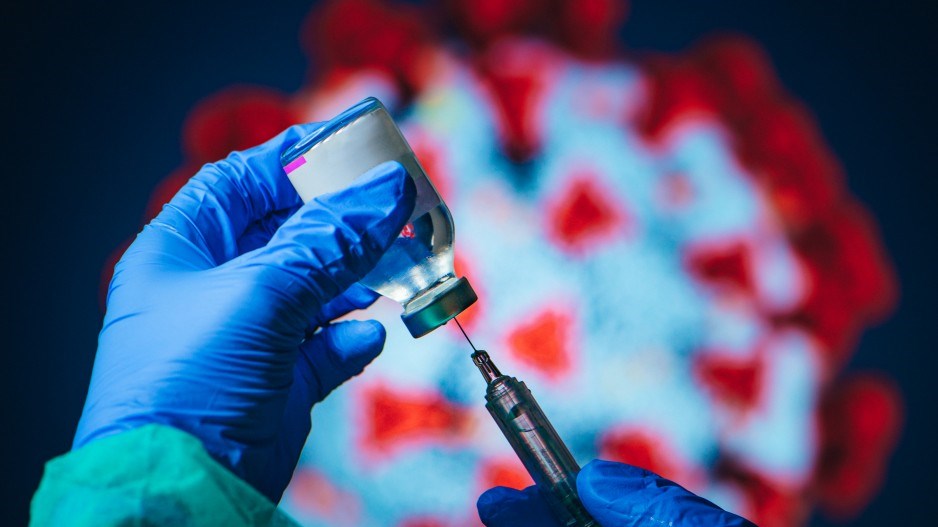Canadian regulators have given the green light to Pfizer Inc.’s (NYSE:PFE) vaccine against COVID-19, paving the way for the delivery of as many as 249,000 doses by the end of December.
While Wednesday’s (December 9) approval from Health Canada will allow deliveries to begin next week, the emergency use authorization has also delivered a victory to a B.C. biotech that played a critical role in the vaccine’s development.
Acuitas Therapeutics, founded by research veteran Thomas Madden more than a decade ago, developed the lipid nanoparticle technology (LNP) that allows the Pfizer/BioNTech SE (Nasdaq:BNTX) vaccine’s “messenger RNA” (mRNA) technology to work.
“With mRNA, what we are doing is providing instructions to the cells in our body to make a component – a protein on the surface – of the COVID-19 virus,” Madden, president and CEO of Acuitas, told BIV last month.
“And when our body produces that protein, our immune system recognizes it as being foreign and produces a response against it.”
The challenge, Madden said, is that, when injected, mRNA is easily broken down by the body. The mRNA also cannot enter human body cells without help.
Enter Acuitas’s LNP technology, which essentially acts as a delivery vehicle for the mRNA to travel through the human body and enter the cells unharmed.
“It is humbling to realize that Acuitas Therapeutics played a role in bringing the world to this moment – where a COVID-19 vaccine has received [Health Canada’s] emergency use authorization,” Madden said in a statement following the approval from Canadian regulators.
“Since February 2020, every single person at Acuitas has dedicated themselves to the development of COVID-19 vaccines to fight this deadly and devastating virus – working nights and weekends, missing important personal events and, I can confirm, losing a lot of sleep. I am very proud of what we have accomplished as a team and in partnership with BioNTech and their partner Pfizer.”
The initial doses of the vaccine will be distributed to 14 vaccination centres in urban areas across Canada this month.
“Once we’re comfortable with that process, we will expand deliberately into other areas in full co-ordination with provinces and territories,” former Canadian NATO commander Maj.-Gen. Dany Fortin, who’s leading the National Operations Centre for vaccine distribution, said during a briefing earlier this week.
He said it would likely take a day or two between the time the vaccines are distributed to sites and when a patient can receive their first dose.
Authorities across Canada are currently performing dry runs for distribution of the vaccine ahead of deliveries next week.
Ottawa faces numerous logistical hurdles distributing the doses across the country, including the need for ultra-cold storage for specific vaccines, reaching remote communities and co-ordination between different levels of government.
Ottawa has secured or is in the midst of securing 429 million vaccine doses from seven companies.
For the country of 38 million, it may look like overkill but Prime Minister Justin Trudeau has said previously it was a measure meant to mitigate potential logistical problems if some vaccines don’t work out.
“We know that there is a tremendous amount of uncertainty in terms of which vaccines were going to arrive first, which ones were going to be able to be manufactured quickly. These were always built into our processes as possibilities,” he said during a Monday briefing.
“But let us remember at the beginning there will be smaller amounts of vaccines because we are both setting up our delivery mechanisms but also because manufacturers are limited in what they’re able to produce.”
The government will be ensuring that vaccines are distributed to 205 points of use across the country on a per capita basis as the vaccination plans scale up in the coming weeks and months.
The Pfizer vaccine requires that it’s maintained in freezers at temperatures as low as -80C.
Those vaccines will be delivered directly by the manufacturer to the places of vaccination.
The competing Moderna Inc. (NYSE:MRNA) vaccine, which requires freezing of -20C, will be delivered from the manufacturer by a federally contracted logistics service provider to points of delivery within provinces and territories.
The federal government has secured freezers to facilitate those deliveries.
Both those vaccines require that patients are dosed twice, with doses coming about a month apart.
So while 249,000 doses may be delivered to Canada in December, that does not mean a quarter-million Canadians would immediately be at less risk of contracting the novel coronavirus upon that first dose.
—With files from Chuck Chiang




